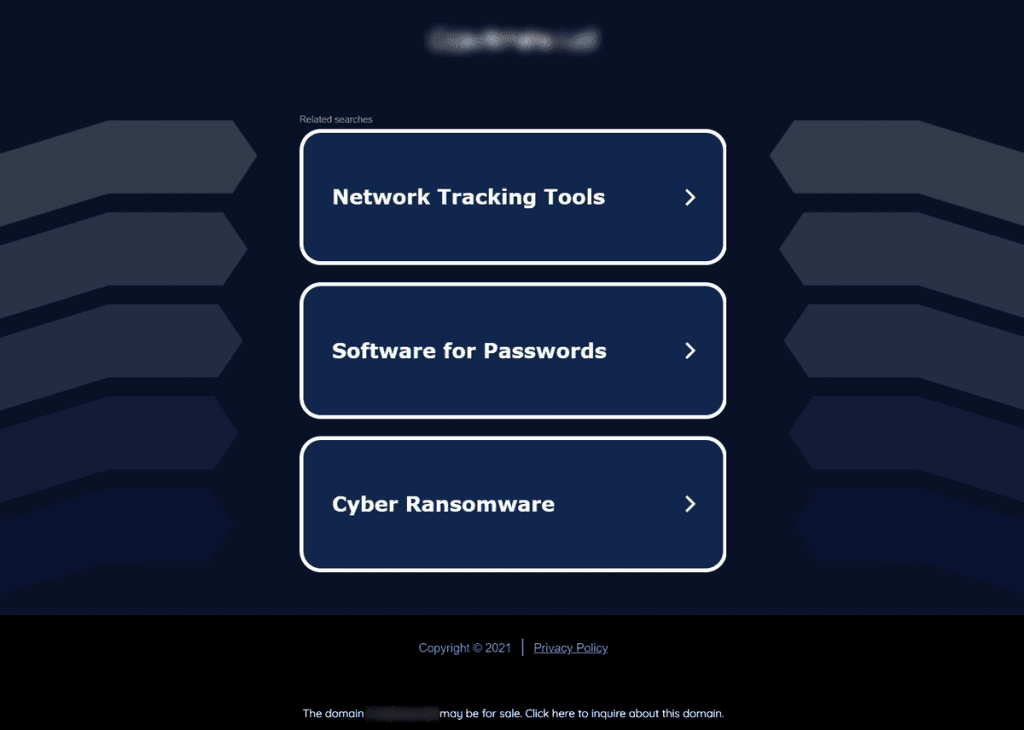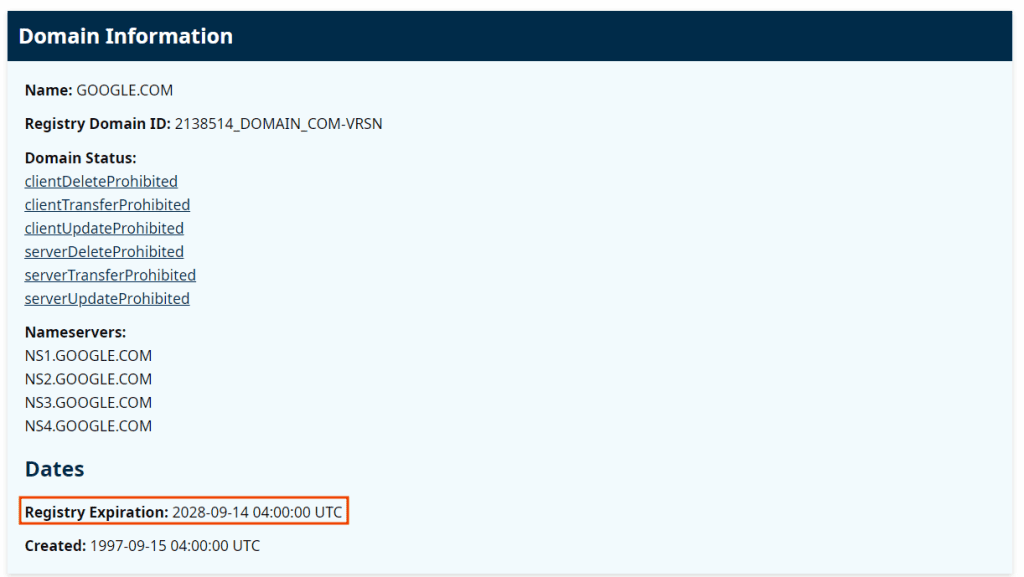If you have forgotten to renew your domain, you might still be in time to recover it. In order to recover an expired domain, there are specific time frames that vary according to the domain extension.
In this article, Expired domains: what happens when a domain expires?, we will see how the life cycle of a domain works, namely all the phases that a domain goes through, starting from when it is free and can be registered, up to its expiration.
We’ll see in which cases it’s possible to recover an expired domain and what to do if it’s not available anymore. We will examine, moreover, the timing and the costs of the recovery from case to case. First, let’s see what happens if you let a domain expire.
Table of Contents
Why you should not let a domain expire
Registering a domain allows you to reserve a domain name and use it for your website. To keep the domain, however, you must renew it before it expires. The domain is renewed annually, but you can also choose a longer period, up to a maximum of ten years.
You will be notified by the provider or registrar before the expiration date. But what happens if you are past the expiration date? In this case, you have to act fast to recover the domain if you don’t want to risk losing it.
Remember that the loss of a domain will also mean a loss of traffic and positioning since you will lose all the optimization work done on your site. In addition, if you don’t have an up-to-date backup copy you may also lose your site’s data.
In addition to these risks, there is the fact that if you want to recover an expired domain in some cases you will have to pay a fee to restore it.
Domain lifecycle
Depending on whether the domain is active, pending transfer, in case the transfer is blocked or in cases of an expired domain, the domain will be associated with a different status. In this case, we’re going to examine the statuses concerning the expiration of the domain.
Available
This status corresponds to available domains, i.e. domains that are not currently registered to anyone. An available domain can be a domain that has never been registered before or a domain that has become available to register again.
Registered
Each internet domain is unique, so after you register a domain name, no one else will be able to use it. At the time of registration or renewal, the term is established, ranging from a minimum of 1 year to a maximum of 10 years.
Expired
An expired domain is a domain that has not been renewed within the established time frame. The day after the expiration date the domain will be blacked out and will no longer be online. Below you can see an example of what an expired domain looks like, in place of the site advertisements.

Expired domains are suspended and cannot be transferred, the only option available is the renewal to recover the domain. The time and manner of renewal vary depending on the status of the domain, within a certain amount of time it will be possible to recover the domain before it is permanently deleted.
After expiration, the domain usually enters the phase called “Grace Period“, followed by the “Redemption Period“. During these transitional phases, you can still recover an expired domain.
Grace Period
The “grace period” can last up to 45 days, the duration varies depending on the domain extension. Expired domains enter this phase and by the end of this period, they can be renewed at the cost of renewal and at no extra charge.
Redemption Period
When the grace period ends, the domain gets cancelled and goes into a new phase, the Redemption Period, which usually lasts up to 30 days.
When the expired domain is in the redemption period it can still be renewed. In this case, however, in addition to the cost of renewal, there is a fee for the recovery of the domain, the cost varies depending on the extension and in general tends to be quite high.
Pending Delete
If during the Redemption Period the domain is not renewed, it enters the “PendingDelete” status for five days. During this phase, the domain cannot be renewed and cannot be registered.
At the end of the five days, the domain is released and once again becomes available for registration. When a domain is available, registration is open to anyone and works on a first-come, first-served basis.
Please keep in mind, then, that if you intend to re-register an expired domain that you had previously registered, you will have to do so before someone else registers it. For this reason, in order not to risk losing your domain name, it is recommended that you renew it before it expires.
Renew expired domain with SupportHost
The recovery of expired domains depends on how many days have passed since the expiration and on the domain extension. Let’s see what happens case by case and how to renew an expired domain.
Before proceeding with the renewal by paying the invoice from your customer area, make sure that your domain can be renewed or that it is still in the grace period in which it can be recovered. Remember that if the domain has been deleted and is available again, someone else may ha taken it.
Expired domain: renewal during the grace period
As we have seen before, after the expiration of the domain you have a “grace period“. During this grace period, the length of time depends on the domain extension, you can restore the expired domain by paying the cost of the renewal.
After the domain expiration, if you renew it within the established period you will not have any additional costs. You just have to pay the invoice and wait for the DNS propagation time for your site to be visible again.
After payment, you will receive an email confirming the renewal, if you do not receive the email within 24 hours of payment open a support ticket.
In the table in the next paragraph, you can see the duration of the grace period for the most common extensions.
Expired domain: renewal during the redemption period
Expired domains that enter the redemption period are to be considered deleted but are still recoverable. In this case, the renewal of an expired domain has additional costs that vary according to the domain extension and depend on the individual registries.
This table summarizes the reactivation fees based on the extension.
Estensione | Costo per il recupero |
|---|---|
.com | 113.00 € |
.it | 7.00 € |
.eu | 7.00 € |
.net | 105.00 € |
.info | 105.00 € |
.org | 105.00 € |
.us | 96.25 € |
.biz | 155.00 € |
.tv | 105.00 € |
.mobi | 180.80 € |
When the domain enters the redemption period, the system adds the recovery fee to the invoice. After payment and after the propagation time has passed, your domain becomes active again and your site goes back online.
Extension | Grace period | Redemption period |
|---|---|---|
.it | 10 days | 30 days |
.eu | 0 days | 40 days |
.com | 30 days | 30 days |
.net | 30 days | 30 days |
.org | 30 days | 30 days |
.info | 30 days | 30 days |
.net | 30 days | 30 days |
Expired domain: what to do if the domain has been deleted
the domain will enter the Pending Delete phase which generally lasts five days. During this period the domain cannot be recovered and cannot be registered again.
At the end of the Pending Delete period the domain will be deleted and available for registration again.
At this point, if you want to recover the expired domain you will have to register it again. If the domain is registered by someone else you have no way to recover it.
Let’s see specifically how the cancellation of “it domains” happens.
When it domains get deleted
The cancellation of it domains is managed by the NIC, the register of .it internet domains. The deletion of domains takes place at set times and according to the Drop Time system.
Every day at 01:00 (CET/CEST) a list is created with today’s deletions and upcoming deletions. These lists are divided according to the following time periods (09:00 and 16:00) when the domains will be deleted and list all the domains that will be deleted.
Please note that as soon as the domain is deleted, it will become free again and can be registered by anyone.
Domain expired: what happens to the hosting plan?
Remember that domain and hosting are two separate services. The recovery of an expired domain depends on the rules of the Registry, that is the entity that manages the top-level domains, and the rules imposed by the Registrar, that is the accredited companies where you can register domains.
In case of an expired domain, after expiration, the hosting service remains active for 5 days. During this period you can access your hosting plan by logging into cPanel or connecting through the hosts file.
After the fifth day from the expiration of the domain, the associated hosting plan is suspended. This suspension period is maintained for 30 days, during which you can renew the domain. On the 30th day of late payment, your account will be terminated and all data will be lost.
Frequently asked questions about domain expiration
In this section, we review the most common questions about expired domains. Let’s look at how to check a domain expiration, what to do to prevent it from expiring, and what entities are involved in domain registration.
How do I check the expiration of the domain?
You can check the expiration date of your domain from the personal area of your hosting service. If you are one of our customers, just log in to the customer area and click on Domains → My Domains.

You will see the list of domains associated with your account and you will be able to check the expiration date or renewal date in case the automatic renewal is active.

Another way to check the expiration of a domain is to consult the Whois database. You can use the Whois tool of the NIC (for it domains) or the ICANN search tool.

How can I prevent my domain from expiring?
If you don’t want to risk losing the ownership of your domain you should avoid letting it expire. Immediately after expiration, you can retrieve the domain, in some cases with the addition of a retrieval fee if more days have passed since expiration.
If you wait too long, however, your domain will be deleted and made available for registration again. In this case, the domain can also be registered by someone else and you risk losing it permanently.
The best thing to do is to act in time and renew the domain by the deadline. In most cases, the best method is to enable auto-renew so that you don’t risk losing your domain just because you forgot to renew it.
If you choose not to enable auto-renew I suggest you set an alert to remind you of the expiration and renew the domain in time.
In any case, you will receive communications from your provider reminding you that the expiration date of your domain is near.
Will I be notified if the domain is about to expire?
The registrar or provider you have chosen to register the domain will notify you with an email communication when the expiration date is approaching.
If you registered a domain with SupportHost you will receive these alerts before the expiration:
- 60 days before: a reminder of the upcoming expiration date
- 30 days before: a reminder of the upcoming expiration date
- 21 days before: a reminder of the upcoming expiration date and a copy of the invoice to be paid
- 14 days before: a reminder of the upcoming due date
- 7 days before: a reminder of the upcoming due date.
Can I transfer an expired domain?
If your domain is expired it cannot be transferred. In this case, if the domain can still be renewed because it is in the grace period or redemption period you can recover the domain by renewing it with the previous provider. After that, you can request the domain transfer.
If the domain has expired and has been deleted you will have to wait for the end of the Pending delete period and you can try to register the domain again.
What do Registry, Registrar and Registrant mean?
The Registry is a kind of registry that collects data about domain names. For each top-level domain (TLD) there is a Registry. For example, the NIC is the Registry of domains .it.
The Registry, however, does not deal with the direct registration of domains, but this task is performed by Registrars.
Registrars are authorized providers who have a contract with the Registry and provide end-users with the possibility to register domains.
The Registrant or Assignee is the end-user (private, institution or company) who registers a domain and therefore becomes its owner. The user who has registered the domain continues to be its assignee until its expiration.
Conclusion
In this article, Expired domains: what happens when a domain expires?, we have seen what the life cycle of a domain is and what happens when it expires. Fortunately, an expired domain can still be renewed, but if you haven’t renewed the domain in time and want to continue to maintain it you should act in time before renewal is no longer possible.
The timing, method and fees for renewal depend on the domain extension and how many days have passed since the expiration. Each Registry, in fact, has its own rules and if you want to recover the domain, it’s important to know the timing and costs of recovery.
Has your domain ever expired? Did you manage to recover it in time? Let me know in the comments below.
Ready to build your WordPress site?
Try our service free for 14 days. No obligation, no credit card required.



